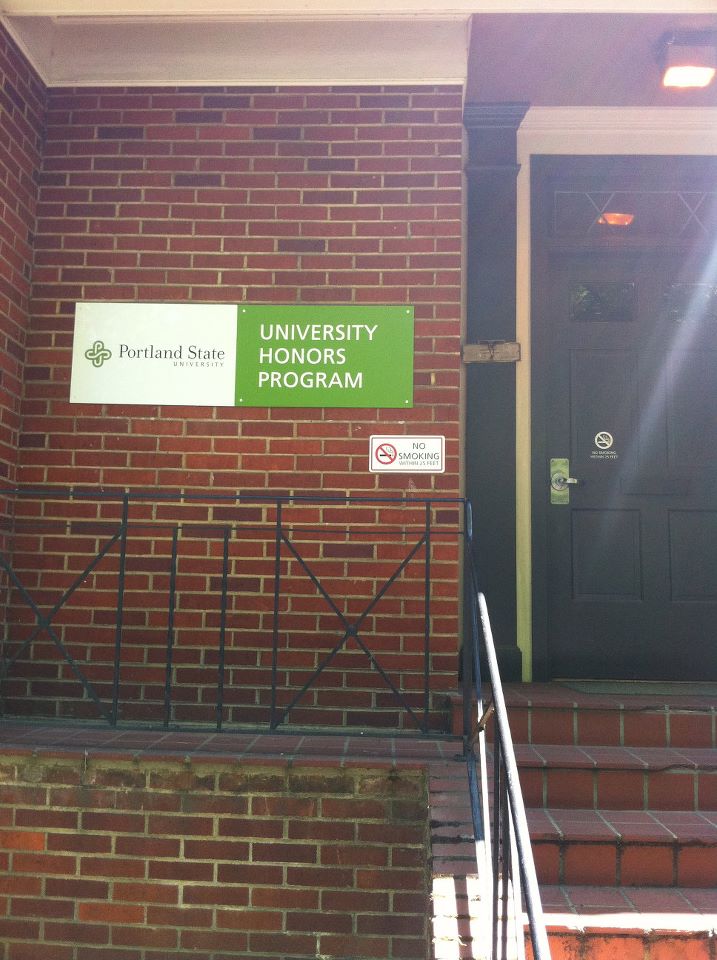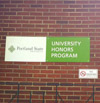 BY WIM WIEWEL | OP-ED CONTRIBUTOR
BY WIM WIEWEL | OP-ED CONTRIBUTOR
It’s tempting to look at PSU from the standpoint of numbers: our growing diversity, record-breaking graduating classes, the $59 million in research grants our professors were awarded last year. But behind the numbers, there is a qualitative picture of PSU that helps explain why we are drawing so many students. One clear example is Urban Honors.
 BY WIM WIEWEL | OP-ED CONTRIBUTOR
BY WIM WIEWEL | OP-ED CONTRIBUTOR
Coming off one of Portland State University’s most rapid growth periods, it’s tempting to look at PSU from the standpoint of numbers: our growing diversity, record-breaking graduating classes, the $59 million in research grants our professors were awarded last year.
But behind the numbers, there is a qualitative picture of PSU that helps explain why we are drawing so many students. One clear example is Urban Honors.
Two years ago, the University received a $1 million gift from the Rose E. Tucker Charitable Trust that enabled us to revamp our honors program, make it more inclusive and sharpen its focus on PSU’s unique urban setting. Director Ann Marie Fallon and Honors faculty worked hard to get the word out about the new Urban Honors program, hosting campus tours and regularly visiting with high school students and teachers in the community.
Their efforts paid off. Enrollment in Urban Honors increased 268 percent over the last two years to the point that it now has about 600 students. The growth has been so significant that in April, we elevated it beyond program status. It is now University Honors College – a name that exemplifies PSU’s commitment to serving more high-achieving students and improving the rigor and reputation of the entire university.
“This will prompt us to expand our honors offerings and to include more in-depth research opportunities. Becoming a college helps us become a center for academic research,” Fallon said.
The Honors College takes what we’re already doing at PSU and makes it more intensive. It attracts a remarkable group of scholars. For example, Theresa Mau, who graduated last year, became the first person in the world to sequence and synthesize spider RNA while a PSU Honors student.
About a third of Honors students come from out of state. They include Ryan Scott, a mechanical engineering student from northern California who graduated from high school with a 4.0 GPA. He continues his 4.0 here at PSU.
“I chose the PSU Honors College for several reasons, primarily because it is a place where I can work with highly motivated students who help me to grow intellectually and as a person,” Scott says. “My other main reason is it allows me access to classes such as ‘The Global City’ and seminars that are not only interesting but of importance to the greater world.”
Next year, the Honors College will welcome a National Merit Scholarship finalist. Only one in a thousand students in the United States who makes it to the finalist level. The student, now finishing his senior year near Seattle, said he was drawn to PSU’s architecture program and the Honors College. PSU was his first college of choice.
Nearly 30 percent of Honors students are the first in their families to go to college, and statistics show that 85 percent of all Honors students will go on to graduate school. Tiffany Morrison, for instance, grew up in hardship and moved from one town to the next during her unsettled childhood before settling at PSU. She got an internship with the National Institutes of Health while a PSU student, and is now in medical school in Philadelphia.
The Honors College is just a slice of the whole. The bigger picture of PSU is of an urban research university with a rising national reputation.
- The number of minority students at PSU has increased more than 57 percent over the last five years. The largest increase is in the enrollment of Latino students. PSU’s 2,386 Latinos now make up nearly two thirds of all underrepresented students on campus.
- Seventeen percent of incoming freshmen this year – including 14 local valedictorians — had near-perfect GPAs in high school.
- Enrollment at the Maseeh College of Engineering and Computer Science rose 22 percent just in the last two years, driven as much by the College’s reputation as the rising job demand in Oregon’s tech sector.
- In September, for the second year in a row, U.S. News & World Report named PSU as a top 10 “up-and-coming” national university in its Best Colleges rankings. The list recognizes universities for making “the most promising and innovative changes in the areas of academics, faculty, student life, campus, or facilities” based on a survey of college administrators.
- Biology professor Ken Stedman received national press coverage for discovering a process that may expand the shelf life of vaccines. Recently retired geology professor Scott Burns was named Outstanding Oregon Scientist of the Year for 2014. And in March, English associate professor Paul Collins won an Oregon Book Award for nonfiction. PSU faculty and their innovative work grab attention far beyond the Portland metro area.
These are just a few examples of Portland State’s growing stature. There are many more. I hope you share my pride in how our faculty and students are shaping this very special place.
Wim Wiewel is president of Portland State University.


 BY WIM WIEWEL | OP-ED CONTRIBUTOR
BY WIM WIEWEL | OP-ED CONTRIBUTOR
